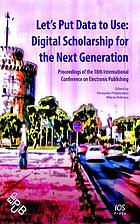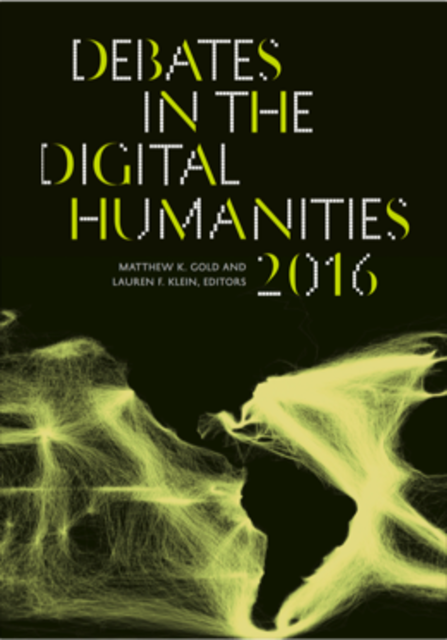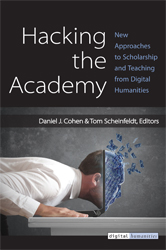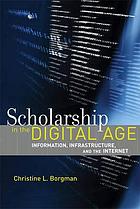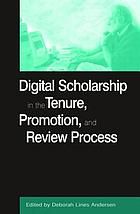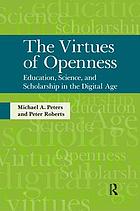Digital Scholarship @ UB: Getting Started
Defining Digital Scholarship
The phrase "digital scholarship" is used to describe many different activities performed by teachers, learners, and scholars from all disciplines. In contrast to traditional scholarship, which communicates the results of scholarly activities in a static form, whether through electronic or printed media, digital scholarship "creates and conveys through rich, layered, linked, and interactive engagements that are only possible in the digital realm." (Craig Dietrich and Ashley Sanders, "On the Word, Digital", from the 2016 Special Issue of dh+lib) Those who work in digital scholarship emphasize that it is as much about the process of creating new forms of scholarship using digital tools and computational methods as it is about the products resulting from scholarly activities like research and teaching.
In practice, digital scholarship can be defined in as many ways as there are researchers creating or using digital tools for research, teaching, and publication. The website whatisdigitalhumanities.com offers a different definition of Digital Humanities - a closely related topic - every time you refresh the page. While digital scholarship projects and activities can appear in numerous forms, they are generally collaborative in nature and require some combination of digital tools or techniques to solve a research or pedagogical problem.
Digital Tools and Methods
This guide provides information and resources for finding support at UB for your digital work. For more information on digital scholarship and digital humanities tools and methodologies, plus resources for planning and sustaining digital projects, please visit the Digital Humanities research guide.
Lockwood Library: Digital Scholarship Studio & Network
Consultation Services
We offer consultation on digital scholarship projects, using digital tools for research and web publishing, working with humanities and social sciences data, and more. Contact Stacy Snyder for more information or to schedule an appointment.
Digital Scholarship Library Workshops
Please visit the Workshops & Events page for more information about current and past library workshops on digital tools for research and teaching.
Digital Humanities Research Workshop Events
Co-sponsored by the UB Humanities Institute and the Digital Scholarship Studio and Network, this event series brings together faculty, students, and technologists to share current digital research and discuss critical issues related to digital humanities and digital pedagogy. Read more on the Workshops & Events page of this guide.
Digital Scholarship Journals
-
Computational CultureThis is an open-access, peer-reviewed journal of interdisciplinary inquiry into the nature of cultural computational objects, practices, processes and structures.
-
Digital Humanities QuarterlyThis is an open-access, peer-reviewed journal published by the Alliance of Digital Humanities Organizations (ADHO). It includes articles, opinion pieces, and interactive media.
-
Digital MedievalistThis is the open-access, peer-reviewed journal of the Digital Medievalist Community. It publishes work of original research and scholarship, theoretical articles on digital topics, notes on technological topics, commentary pieces discussing developments in the field, bibliographic and review articles, tutorials, and project reports.
-
Digital Scholarship in the HumanitiesThis is an international peer-reviewed journal for digital scholarship, published by Oxford University Press. Formerly titled Literary and Linguistic Computing, it is produced by the European Association for Digital Humanities and the Alliance for Digital Humanities Organizations.
-
Digital Studies / Le champ numériqueThis is an open-access, peer-reviewed journal published for the Alliance of Digital Humanities Organisations under the direction of the Canadian Society for Digital Humanities/Société canadienne des humanités numériques (CSDH/SCHN) by the Open Library of the Humanities.
-
Frontiers in Digital HumanitiesThis is an open-access, peer-reviewed journal that publishes research from Digital History to Big Data, providing a community platform for the Humanities in the digital age.
-
Hybrid PedagogyThis is an open-access, peer-reviewed journal that combines the strands of critical and digital pedagogy to arrive at the best social and civil uses for technology in education.
-
International Journal of Humanities and Arts ComputingThis is a peer-reviewed multi-disciplinary journal that publishes research on all aspects of arts and humanities computing.
-
Journal of Data Mining and Digital HumanitiesThis is an open-access, peer-reviewed journal concerned with the intersection of computing and the disciplines of the humanities, with tools provided by computing such as data visualisation, information retrieval, statistics, text mining by publishing scholarly work beyond the traditional humanities.
-
Journal of Digital HumanitiesThis is an open-access, peer-reviewed journal that features scholarship, tools, and conversations produced, identified, and tracked by members of the digital humanities community through Digital Humanities Now.
-
Journal of Interactive Technology and PedagogyThis is an open-access, peer-reviewed journal that promotes open scholarly discourse around critical and creative uses of digital technology in teaching, learning, and research.
-
Journal of Open Humanities DataThis is an open-access, peer-reviewed journal for publications describing humanities data or techniques with high potential for reuse.
-
Journal of the Text Encoding InitiativeThis is the peer-reviewed journal of the Text Encoding Initiative Consortium. It publishes selected papers from the annual TEI Conference and Members' Meeting and special issues based on topics or themes of interest to the community or in conjunction with special events or meetings associated with TEI.
-
KairosThis is an open-access, peer-reviewed online journal exploring the intersections of rhetoric, technology, and pedagogy.
Useful Blogs, Websites, and Professional Forums for Digital Scholarship
ADHO is an international umbrella organization for digital humanities networks, whose primary goals are to promote and support digital research and teaching across arts and humanities disciplines. Since 1989, ADHO has hosted an annual DH conference in cities around the world, typically alternating between North America and Europe each year.
This blog is maintained by the Digital Curators from the British Library's Digital Scholarship Department. They and guest authors post about digital collections, digital projects, collaborations, and more.
Data Carpentry, part of the data science non-profit The Carpentries, offers open-access lessons on fundamental concepts and tools for working effectively with data. Lessons are available on data organization, data cleaning, data management, data analysis, and data visualization for a range of disciplines, especially in the social sciences.
DHNow distributes online articles, conference calls-for-participation, job postings, and more, related to Digital Humanities. It does so using an RSS feed aggregator for high-quality digital humanities scholarship, which is curated by volunteer Editors-at-Large.
The DHSI is an annual summer institute in Victoria, British Columbia, which includes coursework, seminars, and lectures. DHSI participants collaboratively learn and discuss new computing technologies and how these influence teaching, research, publication, and preservation across humanities disciplines.
This crowdsourced calendar is maintained by the Digital Library Federation. It includes events related to digital libraries and archives, digital humanities, open access, digital scholarship, cultural heritage, and related topics.
HASTAC (Humanities, Arts, Science, and Technology Alliance and Collaboratory) is an interdisciplinary community of humanists, artists, social scientists, scientists, and technologists focused on innovation in teaching and learning. The community shares news, tools, methods, and projects, including digital humanities and other digital scholarship research and resources.
H-Net is an international network of humanities and social science scholars. The website publishes essays, job postings, and announcements, and serves as a home for over 180 networks of researchers and teachers focused on particular areas of study, from African American Studies to Historic Preservation to Public Policy.
Humanities Commons is the online network for people working in the humanities. It consists of CORE, an open-access repository for humanities scholarship, groups (micro-communities for shared interests), and a series of forums and blogs. Sub-communities include MLA Commons (for members of the Modern Language Association), CAA Commons (for members of the College Art Association), ASEEES Commons (for members of the Association for Slavic, Eastern European, and Euroasian Studies), and AJS Commons (for members of the Association for Jewish Studies).
The Institute for Liberal Arts Digital Scholarship (ILiADS) is an annual, weeklong digital project incubator that offers participants dedicated time to develop projects in their teams of faculty, students, librarians, and (or) technologists. The institute is hosted at a different institution each year, and teams have the opportunity to work alongside teams from other institutions and ILiADS Liaisons, who provide help with technologies, project guidance, and digital scholarship methods.
Miriam Posner is an Assistant Professor of Information Studies and Digital Humanities at UCLA. Her blog has become a well-known resource for digital humanities practitioners and includes reflections on teaching DH as well as resources for DH projects, courses, and workshops. See especially her highly opinionated guide to DH tools and tutorials and her Pinboard.
The Programming Historian publishes beginner-friendly, peer-reviewed tutorials and lessons on a wide range of digital humanities topics, including data manipulation, text analysis, web scraping, and digital publishing.
Currently on version 3.0, the Text Analysis Portal for Research (TAPoR) project is a discovery interface for text analysis tools, platforms, and projects. It is supported by a network of humanities computing centers working to build a unique human and computing infrastructure for text analysis across Canada.
Digital Scholarship in the Library: A Short Webliography
Essential Reading
Anne, Kirk, et al. May 31, 2017. “Building Capacity for Digital Humanities: A Framework for Institutional Planning.”
Christian-Lamb, Caitlin, Sarah Potvin, and Thomas Padilla. July 29, 2016. "Digital Humanities In the Library / Of the Library."
Lippincott, Joan, Harriette Hemmasi, and Vivian Lewis. June 16, 2014. “Trends in Digital Scholarship Centers.”
Moritz, Carolyn, et al. August 7, 2017. "De-Centering and Recentering Digital Scholarship: A Manifesto."
Muñoz, Trevor. August 19, 2012. “Digital Humanities in the Library isn’t a Service.”
Nowviskie, Bethany. June 28, 2011. “A skunk in the library.”
Posner, Miriam. August 12, 2012. “What are some challenges to doing DH in the library?”
Weiskott, Eric. November 1, 2017. "There is No Such Thing as 'the Digital Humanities.'"
Digital Scholarship Training for Librarians
UB Libraries' CLIR Fellow, Rachel Starry, has developed a series of digital scholarship training modules based on the Social Science Research Council's "Doing Digital Scholarship" lessons. These "meta-modules" are designed specifically for librarians who wish to develop their knowledge and awareness of current digital scholarship tools and methodologies.
Digital Scholarship "Meta-Modules" - Professional Development for Librarians (on GitHub)
Digital Scholarship @ UB was created by UB Libraries' 2018-2020 CLIR Postdoctoral Fellows, Heidi Dodson and Rachel Starry. It is currently maintained by Natalia Estrada. Guide content is licensed CC BY 4.0.

